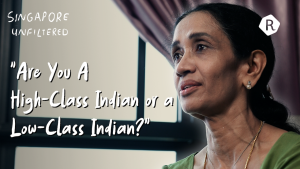Macbeth said this about life, but it also applies to my least-favourite public joke of 2019 so far, and it’s only January. I don’t even need to give this story context; the inciting video has been so widely disseminated, distributed, lampooned, and ridiculed that my title alone makes it obvious what the following article will be about.
What’s interesting, though, is the part of the nearly 2-minute video we chose to pick on.
It’s arguably the most sensational, and therefore laughable, of all her comments. It speaks to a deeper prejudice (and arrogance) held by the speaker—she truly believes that she’s being treated this way because her driver is of a different race, and not just because she’s a nasty woman.
All the same, I wondered if there wasn’t a little catharsis going on every time this loudmouthed lady was lambasted. If we felt as though in ridiculing her, we were rejecting that one racist sentiment, and therefore staging a grander societal put-down of the very idea of racism.
The country comes together to put this lady on blast. We feel justified. We feel woke. We feel righteous. We take comfort in how this incident proves we don’t have to interrogate our personal prejudices and sensitivities.
We know where we stand: racism bad; we not racist, we good.
We make a boogeyman out of that which is obviously bad, committed by others, so that we can ignore the ‘bad’ which is less obvious, committed by ourselves. Or should I say yourselves?
Yes, it’s because you’re Chinese.
To inject some real ‘wokeness’ into your holiday season, I asked some people who won’t be celebrating Chinese New Year (yes, it’s because they’re not Chinese) what memorable little quotes they’re less than thankful to hear this festive season.
Of course, I included my own lil’ race-based nuggets as well. Tastes like chicken!
#1: Fashion foibles
“Slippers and jeans? You bangla ah?”
Ah, bared feet. What’s not to hate? Toe hair, stubby ankles, that strange clash of dark skin with white-ish soles. The bane of every Indian guy who’s bothered just enough to put on pants but just not enough to wear shoes. Or who knows that he’s visiting a home or temple, and won’t be wearing those sweet sweet kicks for very long.
And yet! At one glance from a group of friends, this purely logical choice manages to place me squarely into the fashion category of a foreign worker. Nevermind the question of why is that even a bad thing worth mentioning?
Would you even think that way if it were, say, a Chinese kid rocking the slips and slacks? I think not.
The best part? Cross-dressing (racially, I mean), is often a ‘sign’ of how woke we are as a culture. Every racial harmony day, I got to see plenty of Chinese basic bitches don a sari and bindhi (seemingly obligatory for any popular clique at this point), and twirl around through the school hallways commenting on just how colourful they look.
Look. I’m not Scrooge. Wear what you want; God knows the jubha is comfortable as hell, and I know Chinese friends who wish they could wear it more often. Racial appropriation is a messy issue for another day, and it’s not relevant to this point.
It’s just … the irony. These people, wearing South Asian clothes as a sign of post-racialism, while demeaning people of South Asian heritage for wearing clothes you perceive to be stereotypical of South Asian fashion! It’s so salient that I can practically taste it—like curdled milk.
#2: Spice Squabbling
“I thought Indian can take spicy food one? Don’t be a disgrace.”
I, like many Indian people, love spicy food. What I do not love is my weak stomach. It tends to cause some truly horrendous pain (and other side effects) when I chow down on some chilli chicken. For this reason, I may choose not to partake in the paprika parade, and opt for a spice-less dinner instead. Which would be fine.
If people would stop reacting like I’d just quit breathing.
I’m not sure what’s worse. The ‘disgrace’ jokes, or the following sentiment: “Oh, poor you, life without spice must be so hard on an Indian like you.”
What, do you think that Indians are aliens who need to consume chilli to survive?
The alien analogy fits well. In a society that prioritises tolerance, we fail to have our racial biases contested and defeated.
Additionally, I don’t understand why minorities have to be representative of their race. If a Chinese person doesn’t eat pig’s ears, I don’t ask him why he’s shaming his ancestors. If he’s never read Wu Cheng’en, I don’t tell him that he’s failed his heritage.
Shockingly, I’m not an expert on Hinduism, the diverse Indian culture, or every Indian language under the sun. But who could be?
#3: Lucky Language
“Your English good for a Malay. Why you talk like that one?”
This entry was contributed by a Malay friend.
Singapore’s Singlish landscape is decanted from the various accents, inflections, and habits of speaking that have been titrated into our vocabulary from every corner of God’s green earth and distilled down to a complex concoction. The trouble comes, however, when you expect a certain manner of speaking out of a certain coloured skin bag (aka human).
When a kid feels that everyone expects him to behave a certain way. When he’s told by his friends, by his teachers, by a school-hired-vendor (as was the case for my friend), that he has to speak and act a certain way to be seen as a ‘normal’ minority by the rest, that’s restrictive. That’s confusing. That’s harmful.
To this vein, I’d like to add my own contribution:
“Eh, your English legit quite good sia.”
“Ya lorh, cos he Indian mah”
Of course, some people don’t see why this is a bad thing. Public announcement: it’s called the model minority phenomenon, and it’s a form of prejudice as well.
“But why? It’s a compliment to your race!”
Yes, what a compliment it is! To reduce whatever non-physical positive traits I have to my racial advantages as opposed to my own skills, character, experiences; truly, it makes me feel uplifted and validated as a person.
F**k off.
#4 Mandarin Missteps
“Ni yao chi shen me?”
“Bu zhi dao.”
“Ta ting de dong wo men zai shuo shen me ma?”
“Mei guan xi, mei shi de”
For my fellow non-Mandarin speakers, don’t you love it when the #masterrace starts flexing them Chinese Chops on ya?
I get it. As is the case for any language, certain phrases are better expressed in Mandarin than in English. God knows that O Level idiom list should be put to good use. Conversation interjections in Mandarin are inevitable; for example, Mandarin contains some fantastic phonetic puns that don’t translate into ‘the England’.
I for one greatly appreciate it when my Chinese friends speak a little Mandarin and bother to explain what they’re saying to me, even down to why the puns are funny. I enjoy learning about other cultures and traditions, and language is a way of understanding Chinese culture at a more-than-superficial level.
What I don’t appreciate is lengthy conversations in a foreign language that exclude me from participating in what’s going on.
A point to note is that this isn’t exclusive to Chinese people; groups of minorities can do this as well, and it’ll be just as irritating for their Chinese friends. I think it is fair to say, however, that because Chinese make up the majority (not sure if you noticed!), this is far more likely to happen to me the majority of the time than it is to you.
I already know that I stick out like a sore thumb anytime I enter a barbershop, wet market, or a million other places, so I’d appreciate not being made to feel like the group keling.
Yes, I know what that word means.
#5 Why so serious, bro?
I’ve saved the best for last.
“Why so serious bro? Relax ah, we joking only. I’m not racist, but Indian really cannot get laid one. No lah, just joking lah, chill man.”
Why can’t I just shake it off, take it as a joke? Clearly these people mean no harm; in these examples, I’m not talking about strangers, I’m talking about friends; they don’t want to hurt me, they’re just speaking candidly.
Maybe that’s what hurts the most.
Friends, the people I like and trust, can’t seem to get past the fact that I’m an outsider; like an alien creature they let onto their planet.
Yet to be perfectly honest, they’re not the only ones to blame. So am I.
Back in my (early) schooling days, I told off Indian classmates that I considered too sensitive or politically correct. I wondered why they couldn’t just take the joke, as I did. Because that’s how I learnt to respond to racism: either to play along, and be accepted, or refuse the ‘fun’, and be outcasted. I chose to play along.
Of course, my minority friends now remind me that I had another choice. I could have been a stronger person. I could have had the confidence, the moral integrity, to tell those other kids to get with the program or get out. But I didn’t. I was afraid, alone, and I didn’t want to lose my friends.
Worst of all, some teachers in our school system (not all!) seemed to find it perfectly appropriate to engage in the crass racial humour of their immature charges. Even people who I had been taught to respect were laughing along; what could I do but join in? I chose the wrong, the cowardly way to react.
But I shouldn’t have had to make that choice. Nobody should. Unfortunately, that’s the society our children are raised in; while we become better at being less cruel about it as adults, we still inherit that fundamental racial divide that distinguishes the minority as the Other.
It’s entirely possible, of course, that the only people who click on this article are the people who are already aware of these issues. That’s why, this New Year, I have a job for you, my Chinese friends.
Over your reunion dinner chit-chat, and in between fighting off annoying questions, share this article with the people you care about. Your spinster aunt, your crusty old uncle, your cousin entering National Service, living with a brownie (!!) for the first time. Get them thinking, get them questioning.
Instead of some crafted catharsis, spread the gift, the joy, of understanding.






